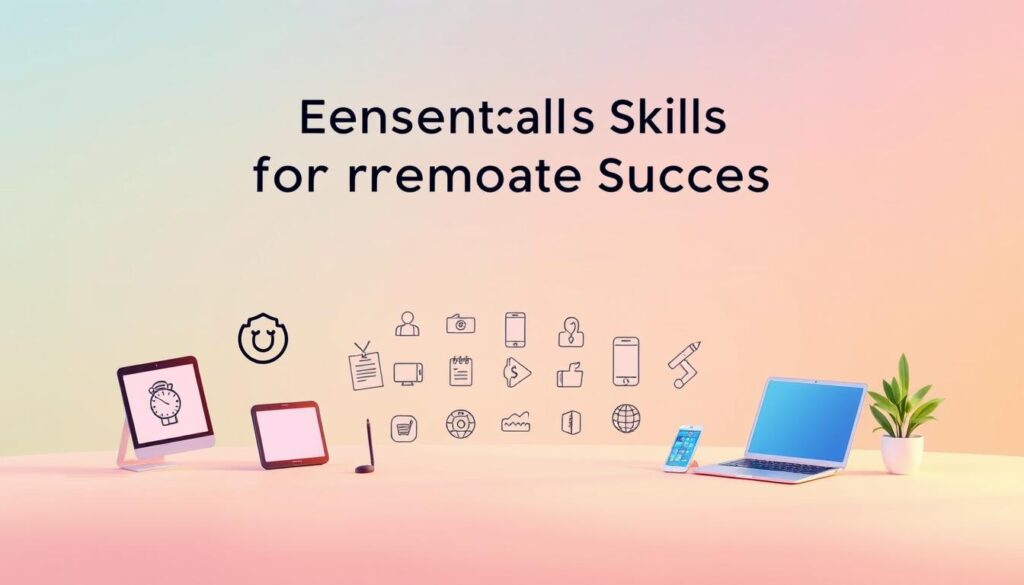Have you ever thought about how to turn your skills into a fulfilling job without leaving your house? The world of work is changing, and more opportunities are opening up for people just like you.
Whether you’re looking for an entry-level role or want to explore new industries, there’s a position out there for you. Remote work offers flexibility, the chance to develop new skills, and the ability to balance your personal and professional life.
In this article, we’ll dive into the types of roles available, how to get started, and the benefits of working from home. Let’s explore how you can take the first step toward a rewarding career.
Introduction to Remote Work for Beginners
Transitioning to remote work was one of the best decisions I’ve made. It opened doors to flexibility, new skills, and a better work-life balance. If you’re just starting, this guide will help you understand what remote work is all about and how you can make it work for you.
My Journey into Remote Work
I started my career in a traditional office setting, but I always felt tied down by the 9-to-5 grind. When I discovered remote job opportunities, I took the leap. My first role was an entry-level customer service position. It was challenging at first, but the flexibility and freedom were worth it.
Over time, I learned to manage my schedule, communicate effectively, and stay productive. The key was finding the right balance between work and personal life. Now, I can’t imagine going back to a traditional office.
Remote work isn’t just about working from home. It’s about creating a lifestyle that works for you. Whether you’re a parent, a student, or someone looking for a career change, there’s a role out there that fits your needs.
Here are a few things I’ve learned along the way:
- Communication is key. Whether it’s with your team or clients, clear and timely communication is essential.
- Time management is crucial. Without a structured office environment, it’s easy to get distracted.
- Invest in a good setup. A comfortable workspace can make a big difference in your productivity.
According to recent trends, more companies are embracing remote work. In fact, over 60% of businesses now offer flexible work options. This shift has created countless opportunities for beginners to enter the workforce without prior experience.
In the next sections, we’ll explore the benefits of working from home, the types of roles available, and how to get started. Whether you’re looking for a full-time position or a freelance gig, there’s something for everyone.
Benefits of Working from Home
One of the best decisions I made was embracing the flexibility of working from home. It’s not just about avoiding the daily commute—it’s about creating a lifestyle that works for you. Whether you’re juggling family responsibilities or pursuing personal goals, remote work offers unique advantages that can transform your career and wellbeing.

Flexibility and Work-Life Balance
One of the biggest perks of working from home is the ability to design your own schedule. No more rushing to beat traffic or missing important family moments. You can start your day earlier, take breaks when needed, and even squeeze in a workout during lunch. This flexibility has helped me achieve a healthier work-life balance.
Studies show that 89% of employees prefer working from home at least part-time. The reason? It reduces stress and increases personal time. Without the daily commute, I’ve gained hours each week to focus on hobbies, family, and self-care.
Skill Development Opportunities
Remote work isn’t just about convenience—it’s a chance to grow professionally. Even in entry-level roles, you can develop valuable skills like time management, communication, and tech proficiency. For example, my first remote job in customer service taught me how to troubleshoot problems and work independently.
Many companies offer on-the-job training for remote positions. Whether it’s learning new software or improving your writing, there’s always an opportunity to expand your skill set. Plus, a comfortable home office setup can boost productivity and focus.
Working from home has also improved my overall wellbeing. I sleep better, eat healthier, and have more energy for both work and personal projects. It’s a lifestyle that truly supports growth and balance.
30 Beginner-Friendly Remote Jobs That Are Always Hiring
Exploring new career paths from the comfort of your home has never been easier. Whether you’re just starting out or looking to switch industries, there’s a role out there for you. Below, we’ve compiled a list of accessible positions that are perfect for beginners. These roles require minimal experience and offer a chance to develop valuable skills.
Tech Roles for Beginners
Tech is a growing field with plenty of opportunities for those new to the industry. Here are a few roles to consider:
- Junior Quality Assurance Engineer: Test software and ensure it meets quality standards. No prior experience required.
- IT Support Specialist: Help clients troubleshoot technical issues. Training is often provided.
- Data Entry Clerk: Input and manage data for businesses. Ideal for detail-oriented individuals.
Customer Support Positions
Customer support roles are a great way to build communication skills while working from home. Some examples include:
- Customer Service Representative: Assist clients with inquiries and resolve issues. Many companies offer training.
- Sales Support Associate: Help sales teams manage accounts and provide product information.
- Virtual Call Center Agent: Handle inbound and outbound calls for various industries.
Administrative and Writing Roles
If you’re organized or enjoy writing, these roles might be a perfect fit:
- Virtual Assistant: Manage schedules, emails, and tasks for busy professionals.
- Content Writer: Create blog posts, articles, and other written content for businesses.
- Proofreader: Review and edit written materials for accuracy and clarity.
These roles are just the beginning. Many companies are actively hiring for these positions, making it easier than ever to start your career from home. Whether you’re looking for full-time work or a flexible part-time job, there’s something for everyone.
Navigating Top Remote Job Boards
Finding the right platform to start your remote career can make all the difference. With so many options available, it’s important to know which job boards cater specifically to beginners. These platforms not only list entry-level roles but also provide tools to streamline your search.

Curated Listings for Beginners
Job boards like FlexJobs and We Work Remotely are excellent starting points. They curate listings that match your experience level, making it easier to find roles that fit your skill set. For example, FlexJobs hand-screens every posting to ensure legitimacy, while We Work Remotely focuses on high-quality opportunities in tech and customer service.
Here’s a quick breakdown of some top platforms:
- FlexJobs: Offers a wide range of roles across industries, with advanced filters for entry-level positions.
- We Work Remotely: Features a large database of remote jobs, particularly in software engineering and marketing.
- Jobspresso: A smaller but highly curated platform with a focus on quality over quantity.
- Remote.co: Exclusively lists remote-only roles, making it a great resource for beginners.
These platforms also offer features like resume uploads and email alerts. This means you can stay updated on new job postings without constantly checking the site. Many top companies post exclusively on these boards, giving you access to opportunities you won’t find elsewhere.
When using these boards, I recommend setting up detailed filters. Narrow your search by role, location, and experience level to save time. Don’t forget to upload your resume and enable email notifications. This way, you’ll be the first to know when a new position opens up.
Starting your remote career doesn’t have to be overwhelming. With the right tools and a bit of patience, you’ll find the perfect job that fits your lifestyle and goals.
Exploring Entry-Level Remote Roles
Starting a career from home has never been more accessible, especially for beginners. Entry-level remote roles are designed for those with minimal experience, making them a great way to step into the workforce. These positions often come with training and support, helping you build valuable skills while working from the comfort of your home.

What makes these roles unique is their diversity. Whether you’re interested in tech, customer service, or administrative tasks, there’s a role for you. For example, IT support specialists and data entry clerks are in high demand, with many companies offering on-the-job training. These positions not only provide a steady income but also pave the way for long-term career growth.
Varied Sectors and Opportunities
The beauty of entry-level remote work lies in its variety. From tech to creative fields, there’s something for everyone. Here are a few sectors to consider:
- Tech Roles: Positions like IT support specialists and junior web developers are perfect for beginners. These roles often require basic technical knowledge and offer competitive pay.
- Customer Service: If you enjoy helping others, roles like virtual call center agents or sales support associates might be a great fit. These positions focus on communication and problem-solving.
- Administrative Support: Virtual assistants and project coordinators are essential for many businesses. These roles teach organizational and time management skills.
Entry-level remote jobs are more than just a paycheck—they’re an opportunity to grow. Many positions offer flexibility, allowing you to balance work with personal commitments. Plus, the skills you gain can open doors to higher-paying roles in the future.
Based on my experience, the key to success in these roles is staying proactive. Take advantage of training programs, ask questions, and seek feedback. The remote job market is growing, and with the right approach, you can build a fulfilling career from anywhere.
Customer Service and Support Roles
Customer service roles have become a gateway for many to start their remote careers. These positions are not only accessible but also provide a solid foundation for building essential skills while working from home. Whether you’re new to the workforce or transitioning from a traditional office, these roles offer flexibility and growth opportunities.

What Does a Remote Customer Service Representative Do?
A remote customer service representative assists clients with inquiries, resolves issues, and provides product information. This role requires strong communication skills and the ability to manage time effectively. Many companies offer training, making it an ideal entry-level position for beginners.
Here’s what you’ll typically do in this role:
- Respond to customer inquiries via phone, email, or chat.
- Resolve issues and escalate complex cases when necessary.
- Maintain accurate records of customer interactions.
Why Choose a Customer Service Role?
One of the biggest benefits of this position is the flexible scheduling. Many companies offer part-time or alternative hours, making it perfect for parents, students, or anyone balancing multiple commitments. For example, I started my remote career as a customer service representative, and the flexibility allowed me to manage my personal and professional life seamlessly.
Here are a few reasons why this role is a great starting point:
- It requires minimal experience, with many companies providing on-the-job training.
- You’ll develop valuable skills like communication, problem-solving, and time management.
- There’s potential for career growth, with opportunities to move into supervisory or specialized roles.
Companies Hiring for These Roles
Many companies are actively hiring for remote customer service positions. For instance, Amazon, LiveOps, and Alorica at Home regularly post job openings. These companies often provide flexible schedules and competitive pay, making them attractive options for beginners.
Here’s a quick look at some opportunities:
- Customer Support Associate: Salaries range from $45,000 to $60,000 annually.
- Customer Service Representative: Hourly wages typically range from $20 to $25.
- Bilingual Client Care Counselor: Offers alternative schedules and remote options.
Starting a career in customer service is more than just a job—it’s an opportunity to grow. With the right approach, you can build a fulfilling career from the comfort of your home.
Tech-Related Remote Jobs for Beginners
Tech-related roles are opening doors for beginners to work from anywhere. Whether you’re interested in coding, design, or marketing, there’s a position for you. The demand for tech skills is growing, making it easier than ever to start a career from home.

Remote IT and Developer Opportunities
If you’re new to tech, roles like Junior Quality Assurance Engineer or IT Support Specialist are great starting points. These jobs often require minimal experience and provide on-the-job training. For example, a Junior QA Engineer tests software to ensure it meets quality standards, while an IT Support Specialist helps clients troubleshoot technical issues.
Here are some key skills that can help you succeed:
- Basic knowledge of programming languages like Python or JavaScript.
- Strong problem-solving abilities.
- Attention to detail for tasks like debugging or data entry.
According to the Bureau of Labor Statistics, IT roles are projected to grow by 11% through 2033. This makes it a promising field for beginners.
Digital Marketing and Design Roles
Creative minds can thrive in digital marketing and design. Roles like Digital Marketing Specialist or UX Designer are perfect for those who enjoy strategy and creativity. These positions involve creating campaigns, designing user-friendly interfaces, and analyzing data to improve business outcomes.
Here’s what you’ll need to get started:
- Familiarity with tools like Google Analytics or Adobe Creative Suite.
- Strong communication skills for collaborating with teams.
- A creative mindset to develop engaging content.
Digital marketing roles are expected to grow by 8% in the next decade, offering plenty of opportunities for beginners.
Starting a tech career remotely is more accessible than ever. With the right skills and resources, you can build a rewarding future from the comfort of your home.
Freelance and Contract Opportunities
Freelancing has become a popular way to work independently and build a career from anywhere. For beginners, it’s an excellent opportunity to gain experience while enjoying flexibility. Platforms like Upwork, Fiverr, and Freelancer.com connect freelancers with clients worldwide, offering a wide range of projects.

Platforms to Kickstart Your Freelancing
Starting as a freelancer is easier than ever, thanks to platforms designed for beginners. These sites allow you to showcase your skills and find work that matches your expertise. For example, Upwork offers entry-level roles in writing, design, and administrative support.
Here’s how these platforms can help you:
- Build a Portfolio: Complete small projects to showcase your abilities.
- Gain Experience: Work with diverse clients to learn new skills.
- Flexible Scheduling: Choose projects that fit your availability.
Freelancing also allows you to control your career path. You can focus on areas you’re passionate about, whether it’s graphic design, content writing, or virtual assistance. Over time, you can increase your rates and take on more complex projects.
One of the biggest benefits of freelancing is the ability to work from home. You can create a schedule that suits your lifestyle, whether you’re a parent, student, or someone balancing multiple commitments. This flexibility makes freelancing an attractive option for many.
To succeed, start by setting up a professional profile. Highlight your skills and include examples of your work. When bidding for projects, tailor your proposals to the client’s needs. With persistence and effort, freelancing can become a rewarding career choice.
Essential Skills for Remote Success
Mastering the right skills can make or break your remote work experience. Whether you’re in an entry-level role or a seasoned professional, certain abilities are crucial for thriving in a remote environment. From communication to time management, these skills can set you apart and help you excel in your career.

Communication and Time Management
Effective communication is the backbone of remote work. Without face-to-face interactions, clear and concise messaging becomes essential. Whether you’re emailing a client or collaborating with your team, good communication ensures everyone is on the same page.
Time management is equally important. Without a structured office environment, it’s easy to lose focus. Tools like calendars and task managers can help you stay organized. Spending just 12 minutes planning your day can save you two hours of wasted time.
Self-Discipline and Digital Literacy
Self-discipline is key to staying productive. Setting clear boundaries between work and personal life helps maintain a healthy balance. Create a dedicated workspace and stick to a routine to avoid distractions.
Digital literacy is another must-have skill. Familiarity with tools like Slack, Zoom, and project management software can make your work more efficient. Many companies offer training to help you get up to speed.
Resources for Skill Development
There are plenty of resources to help you improve these skills. Online platforms like Coursera and LinkedIn Learning offer courses on communication, time management, and digital tools. Investing in these resources can boost your career growth.
Remember, the right skills not only make you more effective but also open doors to new opportunities. Whether you’re just starting or looking to advance, these abilities are essential for long-term success in remote work.
Preparing for a Remote Job Interview
Securing a remote job starts with nailing the interview and setting up a professional workspace. Whether you’re applying for an entry-level role or a more advanced position, preparation is key. Let’s explore how to create a distraction-free home office and ace your next interview.

Home Office Setup Tips
Your workspace plays a big role in how you perform during a remote job interview. A clean, professional environment shows you’re serious about the opportunity. Here’s a quick checklist to get started:
- Choose a quiet space: Avoid areas with distractions like pets or loud noises.
- Invest in good lighting: Natural light works best, but a ring light can also enhance visibility.
- Test your tech: Ensure your internet, camera, and microphone are working smoothly.
- Keep it tidy: A clutter-free background creates a positive impression.
Setting up a dedicated workspace not only helps during the interview but also boosts your productivity for future work.
Interview Best Practices
Remote interviews require a slightly different approach than in-person ones. Here are some tips to help you stand out:
- Dress professionally: Even if you’re at home, dressing up can boost your confidence.
- Practice common questions: Be ready to discuss your experience, problem-solving skills, and why you’re a good fit for the company.
- Use a digital background: If your space isn’t ideal, a virtual background can keep the focus on you.
- Maintain eye contact: Look at the camera, not the screen, to create a connection with the interviewer.
After the interview, send a thank-you email to express your appreciation and reiterate your interest in the role. This small gesture can leave a lasting impression.
Remember, preparation and professionalism are your best tools for success. With the right setup and mindset, you’ll be ready to land your dream remote job.
Flexible Work Options for Diverse Lifestyles
Flexible work options are transforming how people balance their personal and professional lives. Whether you’re a parent, a senior, or someone with unique needs, remote work offers solutions that fit your lifestyle. These opportunities are designed to provide support and adaptability, making it easier to juggle family, health, and career goals.

Opportunities for Parents, Seniors, and More
Parents often face the challenge of balancing childcare with their careers. Remote work eliminates this struggle by offering flexible schedules. For example, roles like virtual assistant or customer service representative allow you to work from home while managing family responsibilities.
Seniors also benefit from remote work. Many older adults are re-entering the workforce or seeking part-time roles to stay active. Positions like online tutor or proofreader are perfect for leveraging years of experience without the need for a physical office.
Here are some examples of roles tailored for diverse lifestyles:
- Virtual Assistant: Manage schedules and tasks for busy professionals.
- Online Tutor: Teach subjects you’re passionate about from the comfort of your home.
- Customer Service Representative: Assist clients with inquiries and resolve issues.
Statistics show that the demand for these roles is growing. For instance, translator and interpreter jobs are projected to grow by 24% by 2030, while home care provider openings are expected to increase by 33% over the next decade.
From my experience, remote work has been a game-changer. It allowed me to spend more time with my family while pursuing my career. The flexibility and supportive environment make it an ideal choice for anyone looking to balance their personal and professional life.
If you’re considering remote work, explore the opportunities available. Whether you’re a parent, senior, or someone with unique needs, there’s a role out there that fits your lifestyle. Take the first step toward a more balanced and fulfilling future.
Maximizing Your Remote Job Search
Finding the right remote job can feel overwhelming, but with the right tools, it’s easier than you think. Platforms like LinkedIn and Indeed are packed with opportunities for beginners and experienced professionals alike. Here’s how to make the most of your search and land the perfect role.
Setting Up Your Profile
Start by creating a standout profile on major job boards. Use keywords like “remote,” “entry-level,” or “customer service” to highlight your skills. Include a professional photo and a concise summary that showcases your experience and goals.
On LinkedIn, optimize your headline to reflect your desired position. For example, “Aspiring Remote Customer Service Specialist” can catch a recruiter’s eye. Don’t forget to list your skills and endorsements to build credibility.
Using Filters and Keywords
Narrow your search by using filters. On Indeed, select “Remote” under location and add keywords like “work from home” or “virtual assistant.” This ensures you only see relevant listings.
On LinkedIn, use the “Remote” filter under job type. You can also save searches and set up email alerts to stay updated on new opportunities.
Optimizing Your Resume
Tailor your resume for each job application. Highlight remote-friendly skills like time management, communication, and tech proficiency. Use action verbs to describe your experience and achievements.
For example, instead of saying “Handled customer inquiries,” write “Resolved 50+ customer inquiries daily with a 95% satisfaction rate.” This makes your resume stand out.
Leveraging Professional Networks
Networking is key to finding hidden opportunities. Connect with professionals in your desired field on LinkedIn. Join groups related to remote work and participate in discussions to increase your visibility.
Don’t hesitate to reach out to recruiters or hiring managers directly. A personalized message can make a lasting impression and open doors to unadvertised roles.
Success Stories
Many people have found their dream remote job using these strategies. For example, one user landed a customer service role by optimizing their LinkedIn profile and applying early. Another secured a virtual assistant position by networking with industry professionals.
By following these steps, you can maximize your remote job search and find a role that fits your lifestyle. For more remote job opportunities, check out this helpful resource.
Insider Tips to Land Your Dream Remote Job
Building a strong network and showcasing your skills can be the key to landing your dream remote job. In today’s competitive market, it’s not just about applying—it’s about standing out. Here’s how I’ve successfully navigated the process and what you can do to increase your chances.
Effective Networking in the Virtual Space
Networking is more than just connecting with people—it’s about building relationships. Attend online job fairs and virtual events to meet professionals in your desired field. I’ve found that engaging in discussions and asking thoughtful questions can leave a lasting impression.
Platforms like LinkedIn are invaluable for networking. Join groups related to your industry and participate actively. For example, I landed my first remote role by connecting with a hiring manager through a LinkedIn group. Personalize your messages and focus on how you can add value to their business.
Building a Standout Portfolio
Your portfolio is your chance to showcase your skills and experience. Create a personal website or use platforms like Behance to display your work. I’ve found that including case studies or detailed descriptions of your projects can make a big difference.
When I was starting out, I focused on creating a portfolio that highlighted my versatility. For example, I included samples of my writing, design work, and even a few client testimonials. This approach helped me secure multiple freelance opportunities.
Leveraging Referrals and Mentors
Referrals can significantly speed up the hiring process. Don’t hesitate to ask colleagues or mentors for recommendations. I’ve found that a simple request like, “Do you know of any openings that might suit my skills?” can open doors.
Building mentor relationships has also been crucial for my career growth. A mentor can provide guidance, introduce you to their network, and even recommend you for roles. I’ve benefited immensely from having someone who believed in my potential.
Balancing Skills and Self-Promotion
While improving your technical skills is important, don’t forget to promote yourself effectively. Share your achievements on social media and update your profiles regularly. I’ve found that posting about completed projects or new certifications can attract attention from potential clients or employers.
For example, after completing a major project, I shared a detailed post on LinkedIn. This led to several inquiries and even a job offer. Remember, self-promotion isn’t about bragging—it’s about showcasing your value.
By focusing on networking, building a strong portfolio, and leveraging referrals, you can significantly improve your chances of landing your dream remote job. Start today, and take the first step toward a fulfilling career.
Overcoming Common Remote Work Challenges
Working from home comes with its own set of challenges, but with the right strategies, you can thrive in a remote environment. From managing your time effectively to creating a workspace that minimizes distractions, small changes can make a big difference. Let’s explore how to tackle these hurdles and make the most of your remote job.
Time Management Strategies
One of the biggest challenges of working from home is staying on track. Without the structure of an office, it’s easy to lose focus. Here are some tips to help you manage your time better:
- Set a schedule: Create a daily routine that includes start and end times for your work.
- Use digital tools: Apps like Trello or Google Calendar can help you organize tasks and deadlines.
- Take breaks: Short breaks can boost productivity and prevent burnout.
For example, I use the Pomodoro Technique—working for 25 minutes, then taking a 5-minute break. This keeps me focused and energized throughout the day.
Creating a Distraction-Free Environment
Distractions can derail your productivity, especially at home. Here’s how to create a workspace that helps you stay on task:
- Choose a quiet spot: Pick a dedicated area away from household noise.
- Invest in ergonomic furniture: A comfortable chair and desk can make a big difference.
- Limit interruptions: Let family members know your work hours to minimize disruptions.
I’ve found that keeping my workspace tidy and free of clutter helps me stay focused. A clean environment leads to a clear mind.
By implementing these strategies, you can overcome common remote work challenges and create a productive, balanced routine. For more tips on finding the perfect remote job opportunities, check out this helpful resource.
Remote Work Trends in the United States
The landscape of work in the U.S. has shifted dramatically since the pandemic, opening doors to new possibilities. Remote work, once a niche option, has become a mainstream choice for millions. This transformation has created countless opportunities for individuals across diverse backgrounds.
Before the pandemic, only about 4% of jobs were remote. Today, that number has skyrocketed to over 15%. This growth isn’t just a temporary shift—it’s a long-term trend reshaping the future of work. Companies are embracing hybrid models, offering employees the flexibility to work from home part-time or full-time.
Post-Pandemic Growth and Opportunities
The demand for remote roles has surged, with many companies recognizing the benefits of flexible work arrangements. Studies show that 74% of employees feel happier when working remotely, and 97% recommend it to others. This shift has also led to significant cost savings for businesses, with some saving up to $11,000 per employee annually.
Older workers are among the groups benefiting most from these trends. Many are re-entering the workforce or transitioning to part-time roles that fit their lifestyles. For example, positions like online tutor or virtual assistant allow them to leverage their experience without the need for a physical office.
Emerging sectors, such as tech and digital marketing, are driving this growth. Roles like Junior Quality Assurance Engineer and Digital Marketing Specialist are in high demand, offering beginners a chance to build valuable skills. These positions often come with training, making them accessible to those with minimal experience.
From my perspective, these trends are incredibly promising for beginners. The flexibility and support offered by remote work make it easier than ever to start a career from anywhere. Whether you’re a recent graduate, a parent, or someone looking for a change, there’s a role out there for you.
As we look to the future, remote work will continue to evolve. By staying informed and adaptable, you can take full advantage of these opportunities and build a fulfilling career from the comfort of your home.
Embracing Your Remote Future
The future of work is here, and it’s more flexible than ever. Throughout this article, we’ve explored how remote roles can transform your career, offering flexibility, balance, and growth opportunities. Whether you’re starting with an entry-level role or transitioning to a new field, the possibilities are endless.
Taking the first step is easier than you think. Update your resume, explore job boards, and connect with professionals in your desired field. Remote work isn’t just about working from home—it’s about creating a lifestyle that works for you.
Embrace the chance to develop new skills and gain valuable experience. The demand for remote talent is growing, and companies are eager to hire dedicated individuals. Start your journey today and discover the freedom of a remote career.
For more opportunities, check out this helpful resource. The future is bright, and it’s waiting for you to take the leap.








